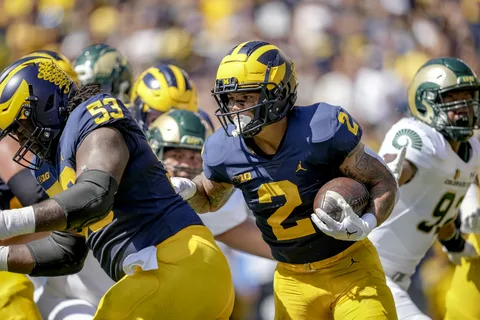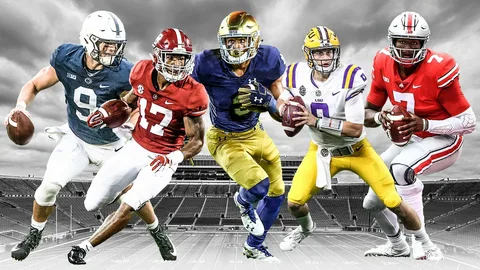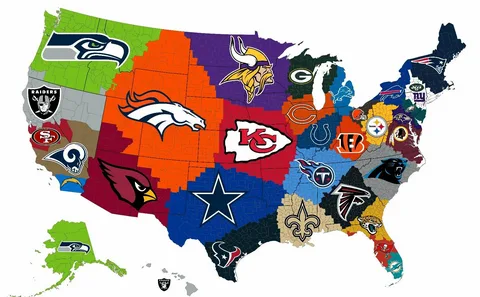
Michigan Football Schedule
Certainly! Here’s the organized schedule for (Michigan Football) the University of Michigan’s 2024 football season:
| Week | Location | Result | Opponent | TV | Date | Time |
| W12 | Home | W, 30-3 | East Carolina | Peacock | Sep 2 (Sat) | Noon |
| W13 | Home | W, 35-7 | UNLV | CBS | Sep 9 (Sat) | 3:30 PM |
| W14 | Home | W, 31-6 | Bowling Green | Big Ten Net | Sep 16 (Sat) | 7:30 PM |
| W15 | Home | W, 31-7 | Rutgers | Big Ten Net | Sep 23 (Sat) | 12:00 PM |
| W16 | Away | W, 45-7 | Nebraska | Fox | Sep 30 (Sat) | 2:30 PM CT |
| W17 | Away | W, 52-10 | Minnesota | NBC | Oct 7 (Sat) | 6:30 PM CT |
| W18 | Home | W, 52-7 | Indiana | Fox | Oct 14 (Sat) | Noon |
| W19 | Away | W, 49-0 | Michigan State | NBC | Oct 21 (Sat) | 7:30 PM |
| W20 | Home | W, 41-13 | Purdue | NBC | Nov 4 (Sat) | 7:30 PM |
| W21 | Away | W, 24-15 | #9 Penn State | Fox | Nov 11 (Sat) | Noon |
| W22 | Away | W, 31-24 | Maryland | Fox | Nov 18 (Sat) | Noon |
| W23 | Home | W, 30-24 | #2 Ohio State | Fox | Nov 25 (Sat) | – |
The Wolverines had an outstanding season, finishing with an undefeated record in both home and away games.
Why Michigan Football Game Delayed
On the 10th of September, 2022, a scheduled football game faced a delay due to adverse weather conditions in Ann Arbor. The game, originally set to kick off at 8 p.m. on Saturday, encountered storms in the vicinity, prompting the organizers to postpone the start.
Weather delays are not uncommon in outdoor sports, and the safety of players and spectators is paramount. When severe weather, such as storms or lightning, is present in the area, sporting events often experience delays or rescheduling to mitigate potential risks.
These decisions are made with the well-being of everyone involved in mind, and organizers closely monitor weather conditions to determine the appropriate course of action. In such cases, fans are typically kept informed about any changes to the schedule through official announcements and updates from the event organizers.
Why Michigan Football Is Overrated
The Michigan football team has been a subject of debate and varying opinions, with discussions on whether they are overrated or overhyped. This sentiment is not uncommon in the world of college football, where fan opinions, media coverage, and team performance contribute to a diverse range of perspectives.
Fans and sports analysts often engage in discussions about team rankings, performance, and perceived hype. In the case of Michigan, debates have centered around factors such as defensive statistics and the team’s overall standing. ESPN and other sports media outlets play a role in shaping public perception through their analysis and commentary.
Criticism and differing opinions about a team’s ranking or reputation are not exclusive to Michigan; they are part of the broader sports culture. Reddit threads and online forums provide platforms for fans to express their views, leading to discussions on topics like team performance, player evaluations, and the overall standing of a program.
While some may argue that Michigan is overrated, others might have contrasting views based on different criteria and perspectives. Sports discussions often involve a mix of objective analysis, subjective opinions, and passionate fan sentiments, contributing to the vibrant and diverse landscape of college football discourse.
Who Is Michigan Football Head Coach
Jim Harbaugh, whose full name is James Joseph Harbaugh, is a prominent figure in American football. Born on December 23, 1963, in Toledo, Ohio, Harbaugh has had a multifaceted career as both a player and a coach.
As a player, Harbaugh was a talented quarterback who made his mark in college football. He played college football at the University of Michigan from 1983 to 1986. During his time with the Michigan Wolverines, Harbaugh displayed exceptional skill and leadership on the field, becoming a key figure for the team.
After his college career, Jim Harbaugh transitioned to the NFL, where he played as a quarterback for various teams, including the Chicago Bears, Indianapolis Colts, Baltimore Ravens, and San Diego Chargers. Harbaugh’s playing career was marked by notable achievements, including leading the Indianapolis Colts to the AFC Championship Game in the 1995 season.
Following his playing days, Harbaugh ventured into coaching, where he found considerable success. His coaching career includes stints with the University of San Diego, Stanford University, and the San Francisco 49ers in the NFL. Notably, he guided the 49ers to three consecutive NFC Championship Games and a Super Bowl appearance during the 2012 season.
In 2015, Jim Harbaugh returned to his alma mater, the University of Michigan, as the head coach of the Michigan Wolverines. His tenure at Michigan has been characterized by a strong emphasis on recruiting top talent and a commitment to revitalizing the program. Harbaugh’s coaching style and dedication to the Wolverines have made him a central figure in college football.
Beyond his achievements on the field, Jim Harbaugh is known for his competitive spirit, innovative coaching approaches, and a passion for the game. His impact on football, both as a player and a coach, has solidified his place in the sport’s history.
Who Is Michigan Football Captain
The Michigan Wolverines football team, as of the current season, has appointed a group of outstanding individuals as team captains. These leaders play a crucial role in guiding and motivating their teammates, both on and off the field. The team captains for Michigan include:
- Michael Barrett (Linebacker): A key player on the defensive side, Barrett brings leadership and skill to the linebacker position. His role involves coordinating defensive efforts and contributing to the team’s overall success.
- Blake Corum (Running Back): As a running back, Corum is a dynamic and versatile player who contributes to the offensive strategy. Known for his agility and speed, he plays a vital role in the team’s ground game.
- Kris Jenkins (Defensive Lineman): Jenkins adds strength and resilience to the defensive line. His ability to disrupt opposing offenses and make impactful plays makes him an essential part of Michigan’s defensive unit.
- Trevor Keegan (Left Guard): Playing a crucial role on the offensive line, Keegan’s responsibilities include protecting the quarterback and creating openings for the running game. His leadership is instrumental in maintaining the team’s offensive efficiency.
- Mike Sainristil (Cornerback): Sainristil is a standout in the secondary, contributing to the team’s pass defense. His skills in coverage and playmaking ability make him a valuable asset in Michigan’s defensive backfield.
- Zak Zinter (Right Guard): Zinter plays a pivotal role on the offensive line, contributing to the team’s protection and blocking schemes. His leadership in the trenches is crucial for the success of Michigan’s offense.
These captains represent the diverse talents and skills that contribute to the Wolverines’ overall performance. Their leadership, both on and off the field, sets the tone for the team and plays a significant role in the pursuit of success throughout the season.
Who Is Michigan Football Best Players
As Team 144 embarks on their journey, several standout players are poised to make a significant impact for the Michigan Wolverines. Here are five key players to watch:
- Blake Corum (Running Back): A returning force, Corum is back for the 2023 season with a determination to address “unfinished business.” As a running back, he brings a dynamic and versatile skill set to the field, capable of making impactful plays in both the running and passing game.
- Kris Jenkins (Defensive Tackle): Positioned on the defensive line, Jenkins is a disruptive force. His ability to penetrate the offensive line, apply pressure on quarterbacks, and halt running plays makes him a key player in Michigan’s defensive strategy.
- J.J. McCarthy (Quarterback): Operating from the quarterback position, McCarthy plays a pivotal role in directing the team’s offense. His decision-making, passing accuracy, and leadership on the field will be crucial in shaping the Wolverines’ offensive success.
- Will Johnson (Cornerback): As a cornerback, Johnson contributes to the team’s pass defense. Known for his coverage skills and playmaking ability, he aims to make a significant impact in limiting opposing teams’ passing attacks.
- Zak Zinter (Offensive Guard): Zinter’s role as an offensive guard is integral to the team’s offensive line. His blocking and protection skills create opportunities for the running backs and provide a shield for the quarterback, contributing to the overall effectiveness of Michigan’s offense.
These five players represent a mix of offensive and defensive talent, each bringing a unique set of skills and strengths to Team 144. Their performances will likely play a crucial role in shaping the Wolverines’ success throughout the season. Keep an eye on these key contributors as they aim to make a lasting impact on the field for Michigan.
What Michigan Football Record
The Michigan Wolverines boast a rich and storied football history, spanning 134 seasons from 1881 to 2023. Here are some key highlights from the school’s football legacy:
- Seasons: The Wolverines have actively participated in collegiate football for 134 seasons, showcasing a longstanding commitment to the sport.
- Record (W-L-T): Over the course of their history, Michigan has compiled an impressive overall record of 975 wins, 345 losses, and 35 ties. This track record reflects the program’s consistency and success on the football field.
- Conferences: Michigan has been affiliated with several conferences throughout its history. Notable conference affiliations include the Big Ten, Western Conference, and periods of independent play. The Wolverines’ involvement in these conferences has contributed to the growth and competitiveness of the program.
- Conference Championships: The Wolverines have claimed the title of conference champions on 44 occasions. These championships underscore Michigan’s dominance within their respective conferences and highlight the program’s ability to rise to the top of the collegiate football landscape.
As one of the powerhouse programs in college football, the Michigan Wolverines’ football history is marked by tradition, success, and a commitment to excellence. The team’s contributions to the sport have left an indelible mark, and each season adds another chapter to the ongoing legacy of Michigan football.
What Michigan Football Ranked
In the fifth and penultimate edition of the College Football Playoff Rankings, released on Tuesday night, college football fans witnessed a shakeup in the top four. The rankings play a crucial role in determining the teams that will compete in the College Football Playoff, adding an extra layer of anticipation and speculation as the postseason approaches.
The College Football Playoff Rankings serve as a barometer of a team’s performance and standing in the national landscape. The selection committee considers various factors, including overall record, strength of schedule, head-to-head matchups, and key victories, to determine the rankings.
As teams jockey for position in the coveted top four spots, the release of each new set of rankings brings excitement and debate among fans, analysts, and players. The rankings provide insights into the committee’s evaluation of teams’ performances throughout the season.
The penultimate edition often sets the stage for the final rankings, which will ultimately determine the playoff participants and the matchups for the semifinals. College football enthusiasts eagerly await the committee’s decisions, and the rankings serve as a focal point of discussion and speculation in the lead-up to the postseason.
With the landscape of college football constantly evolving, the fifth edition of the College Football Playoff Rankings adds another layer of intrigue to the season, setting the stage for the upcoming conference championships and the final push for a coveted playoff spot.
Where Is Michigan Football Stadium
Michigan Stadium, fondly known as “The Big House,” stands as an iconic symbol of college football and is the revered home of the University of Michigan’s football team. Located in Ann Arbor, Michigan, this colossal structure holds several distinctions that make it a legendary venue in the world of sports.
Here are some key features and facts about Michigan Stadium:
- Size and Capacity:
- Michigan Stadium holds the distinction of being the largest stadium in the United States and the entire Western Hemisphere.
- With a seating capacity that can exceed 100,000 spectators, the stadium creates an electric and unmatched atmosphere during Michigan Wolverines home games.
- Global Rankings:
- Globally, Michigan Stadium is the third-largest stadium, emphasizing its colossal scale and significance.
- It ranks as the 34th-largest sports venue in the world, underlining its status as a premier destination for college football enthusiasts.
- History and Legacy:
- Michigan Stadium has a rich history dating back to its official opening on October 1, 1927. Over the decades, it has witnessed countless historic moments, thrilling victories, and the roar of passionate fans.
- The stadium’s moniker, “The Big House,” reflects both its immense size and the formidable presence it holds in the college football landscape.
- Renovations and Upgrades:
- Over the years, Michigan Stadium has undergone renovations and upgrades to enhance the fan experience and modernize its facilities.
- Despite these changes, the stadium has retained its classic and iconic design, preserving the traditions that make it a cherished venue.
- Game-Day Experience:
- Attending a game at Michigan Stadium is a bucket-list experience for college football fans. The sheer scale of the venue, combined with the passionate support of the Wolverines, creates an unparalleled game-day atmosphere.
- Cultural Impact:
- Michigan Stadium extends beyond its role as a sports facility; it holds cultural significance for the university, alumni, and the broader community.
- The iconic imagery of the stadium, packed with maize-and-blue-clad fans, has become synonymous with the spirit of Michigan football.
Michigan Stadium’s towering structure and storied history contribute to its status as a revered institution in college sports. As fans gather within its colossal walls, they become part of a tradition that transcends generations and embodies the essence of college football fandom.
What Michigan Football Games Are On peacock This Year
If you’re a fan of Big Ten football, Peacock is your go-to streaming platform to catch all the live action throughout the season. With an extensive schedule and coverage of the biggest games, Peacock provides a convenient and accessible way for fans to stay connected to the thrilling world of Big Ten football.
Why Michigan Football Game Delayed
On the 10th of September, 2022, a scheduled football game faced a delay due to adverse weather conditions in Ann Arbor. The game, originally set to kick off at 8 p.m. on Saturday, encountered storms in the vicinity, prompting the organizers to postpone the start.
Weather delays are not uncommon in outdoor sports, and the safety of players and spectators is paramount. When severe weather, such as storms or lightning, is present in the area, sporting events often experience delays or rescheduling to mitigate potential risks.
These decisions are made with the well-being of everyone involved in mind, and organizers closely monitor weather conditions to determine the appropriate course of action. In such cases, fans are typically kept informed about any changes to the schedule through official announcements and updates from the event organizers.
Why Michigan Football Is Overrated
The Michigan football team has been a subject of debate and varying opinions, with discussions on whether they are overrated or overhyped. This sentiment is not uncommon in the world of college football, where fan opinions, media coverage, and team performance contribute to a diverse range of perspectives.
Fans and sports analysts often engage in discussions about team rankings, performance, and perceived hype. In the case of Michigan, debates have centered around factors such as defensive statistics and the team’s overall standing. ESPN and other sports media outlets play a role in shaping public perception through their analysis and commentary.
Criticism and differing opinions about a team’s ranking or reputation are not exclusive to Michigan; they are part of the broader sports culture. Reddit threads and online forums provide platforms for fans to express their views, leading to discussions on topics like team performance, player evaluations, and the overall standing of a program.
While some may argue that Michigan is overrated, others might have contrasting views based on different criteria and perspectives. Sports discussions often involve a mix of objective analysis, subjective opinions, and passionate fan sentiments, contributing to the vibrant and diverse landscape of college football discourse.
Who Is Michigan Football Head Coach
Jim Harbaugh, whose full name is James Joseph Harbaugh, is a prominent figure in American football. Born on December 23, 1963, in Toledo, Ohio, Harbaugh has had a multifaceted career as both a player and a coach.
As a player, Harbaugh was a talented quarterback who made his mark in college football. He played college football at the University of Michigan from 1983 to 1986. During his time with the Michigan Wolverines, Harbaugh displayed exceptional skill and leadership on the field, becoming a key figure for the team.
After his college career, Jim Harbaugh transitioned to the NFL, where he played as a quarterback for various teams, including the Chicago Bears, Indianapolis Colts, Baltimore Ravens, and San Diego Chargers. Harbaugh’s playing career was marked by notable achievements, including leading the Indianapolis Colts to the AFC Championship Game in the 1995 season.
Following his playing days, Harbaugh ventured into coaching, where he found considerable success. His coaching career includes stints with the University of San Diego, Stanford University, and the San Francisco 49ers in the NFL. Notably, he guided the 49ers to three consecutive NFC Championship Games and a Super Bowl appearance during the 2012 season.
In 2015, Jim Harbaugh returned to his alma mater, the University of Michigan, as the head coach of the Michigan Wolverines. His tenure at Michigan has been characterized by a strong emphasis on recruiting top talent and a commitment to revitalizing the program. Harbaugh’s coaching style and dedication to the Wolverines have made him a central figure in college football.
Beyond his achievements on the field, Jim Harbaugh is known for his competitive spirit, innovative coaching approaches, and a passion for the game. His impact on football, both as a player and a coach, has solidified his place in the sport’s history.
Who Is Michigan Football Captain
The Michigan Wolverines football team, as of the current season, has appointed a group of outstanding individuals as team captains. These leaders play a crucial role in guiding and motivating their teammates, both on and off the field. The team captains for Michigan include:
- Michael Barrett (Linebacker): A key player on the defensive side, Barrett brings leadership and skill to the linebacker position. His role involves coordinating defensive efforts and contributing to the team’s overall success.
- Blake Corum (Running Back): As a running back, Corum is a dynamic and versatile player who contributes to the offensive strategy. Known for his agility and speed, he plays a vital role in the team’s ground game.
- Kris Jenkins (Defensive Lineman): Jenkins adds strength and resilience to the defensive line. His ability to disrupt opposing offenses and make impactful plays makes him an essential part of Michigan’s defensive unit.
- Trevor Keegan (Left Guard): Playing a crucial role on the offensive line, Keegan’s responsibilities include protecting the quarterback and creating openings for the running game. His leadership is instrumental in maintaining the team’s offensive efficiency.
- Mike Sainristil (Cornerback): Sainristil is a standout in the secondary, contributing to the team’s pass defense. His skills in coverage and playmaking ability make him a valuable asset in Michigan’s defensive backfield.
- Zak Zinter (Right Guard): Zinter plays a pivotal role on the offensive line, contributing to the team’s protection and blocking schemes. His leadership in the trenches is crucial for the success of Michigan’s offense.
These captains represent the diverse talents and skills that contribute to the Wolverines’ overall performance. Their leadership, both on and off the field, sets the tone for the team and plays a significant role in the pursuit of success throughout the season.
Who Is Michigan Football Best Players
As Team 144 embarks on their journey, several standout players are poised to make a significant impact for the Michigan Wolverines. Here are five key players to watch:
- Blake Corum (Running Back): A returning force, Corum is back for the 2023 season with a determination to address “unfinished business.” As a running back, he brings a dynamic and versatile skill set to the field, capable of making impactful plays in both the running and passing game.
- Kris Jenkins (Defensive Tackle): Positioned on the defensive line, Jenkins is a disruptive force. His ability to penetrate the offensive line, apply pressure on quarterbacks, and halt running plays makes him a key player in Michigan’s defensive strategy.
- J.J. McCarthy (Quarterback): Operating from the quarterback position, McCarthy plays a pivotal role in directing the team’s offense. His decision-making, passing accuracy, and leadership on the field will be crucial in shaping the Wolverines’ offensive success.
- Will Johnson (Cornerback): As a cornerback, Johnson contributes to the team’s pass defense. Known for his coverage skills and playmaking ability, he aims to make a significant impact in limiting opposing teams’ passing attacks.
- Zak Zinter (Offensive Guard): Zinter’s role as an offensive guard is integral to the team’s offensive line. His blocking and protection skills create opportunities for the running backs and provide a shield for the quarterback, contributing to the overall effectiveness of Michigan’s offense.
These five players represent a mix of offensive and defensive talent, each bringing a unique set of skills and strengths to Team 144. Their performances will likely play a crucial role in shaping the Wolverines’ success throughout the season. Keep an eye on these key contributors as they aim to make a lasting impact on the field for Michigan.
What Michigan Football Record
The Michigan Wolverines boast a rich and storied football history, spanning 134 seasons from 1881 to 2023. Here are some key highlights from the school’s football legacy:
- Seasons: The Wolverines have actively participated in collegiate football for 134 seasons, showcasing a longstanding commitment to the sport.
- Record (W-L-T): Over the course of their history, Michigan has compiled an impressive overall record of 975 wins, 345 losses, and 35 ties. This track record reflects the program’s consistency and success on the football field.
- Conferences: Michigan has been affiliated with several conferences throughout its history. Notable conference affiliations include the Big Ten, Western Conference, and periods of independent play. The Wolverines’ involvement in these conferences has contributed to the growth and competitiveness of the program.
- Conference Championships: The Wolverines have claimed the title of conference champions on 44 occasions. These championships underscore Michigan’s dominance within their respective conferences and highlight the program’s ability to rise to the top of the collegiate football landscape.
As one of the powerhouse programs in college football, the Michigan Wolverines’ football history is marked by tradition, success, and a commitment to excellence. The team’s contributions to the sport have left an indelible mark, and each season adds another chapter to the ongoing legacy of Michigan football.
What Michigan Football Ranked
In the fifth and penultimate edition of the College Football Playoff Rankings, released on Tuesday night, college football fans witnessed a shakeup in the top four. The rankings play a crucial role in determining the teams that will compete in the College Football Playoff, adding an extra layer of anticipation and speculation as the postseason approaches.
The College Football Playoff Rankings serve as a barometer of a team’s performance and standing in the national landscape. The selection committee considers various factors, including overall record, strength of schedule, head-to-head matchups, and key victories, to determine the rankings.
As teams jockey for position in the coveted top four spots, the release of each new set of rankings brings excitement and debate among fans, analysts, and players. The rankings provide insights into the committee’s evaluation of teams’ performances throughout the season.
The penultimate edition often sets the stage for the final rankings, which will ultimately determine the playoff participants and the matchups for the semifinals. College football enthusiasts eagerly await the committee’s decisions, and the rankings serve as a focal point of discussion and speculation in the lead-up to the postseason.
With the landscape of college football constantly evolving, the fifth edition of the College Football Playoff Rankings adds another layer of intrigue to the season, setting the stage for the upcoming conference championships and the final push for a coveted playoff spot.
Where Is Michigan Football Stadium
Michigan Stadium, fondly known as “The Big House,” stands as an iconic symbol of college football and is the revered home of the University of Michigan’s football team. Located in Ann Arbor, Michigan, this colossal structure holds several distinctions that make it a legendary venue in the world of sports.
Here are some key features and facts about Michigan Stadium:
- Size and Capacity:
- Michigan Stadium holds the distinction of being the largest stadium in the United States and the entire Western Hemisphere.
- With a seating capacity that can exceed 100,000 spectators, the stadium creates an electric and unmatched atmosphere during Michigan Wolverines home games.
- Global Rankings:
- Globally, Michigan Stadium is the third-largest stadium, emphasizing its colossal scale and significance.
- It ranks as the 34th-largest sports venue in the world, underlining its status as a premier destination for college football enthusiasts.
- History and Legacy:
- Michigan Stadium has a rich history dating back to its official opening on October 1, 1927. Over the decades, it has witnessed countless historic moments, thrilling victories, and the roar of passionate fans.
- The stadium’s moniker, “The Big House,” reflects both its immense size and the formidable presence it holds in the college football landscape.
- Renovations and Upgrades:
- Over the years, Michigan Stadium has undergone renovations and upgrades to enhance the fan experience and modernize its facilities.
- Despite these changes, the stadium has retained its classic and iconic design, preserving the traditions that make it a cherished venue.
- Game-Day Experience:
- Attending a game at Michigan Stadium is a bucket-list experience for college football fans. The sheer scale of the venue, combined with the passionate support of the Wolverines, creates an unparalleled game-day atmosphere.
- Cultural Impact:
- Michigan Stadium extends beyond its role as a sports facility; it holds cultural significance for the university, alumni, and the broader community.
- The iconic imagery of the stadium, packed with maize-and-blue-clad fans, has become synonymous with the spirit of Michigan football.
Michigan Stadium’s towering structure and storied history contribute to its status as a revered institution in college sports. As fans gather within its colossal walls, they become part of a tradition that transcends generations and embodies the essence of college football fandom.
What Michigan Football Games Are On peacock This Year
If you’re a fan of Big Ten football, Peacock is your go-to streaming platform to catch all the live action throughout the season. With an extensive schedule and coverage of the biggest games, Peacock provides a convenient and accessible way for fans to stay connected to the thrilling world of Big Ten football.
The Wolverines had an outstanding season, finishing with an undefeated record in both home and away games.






